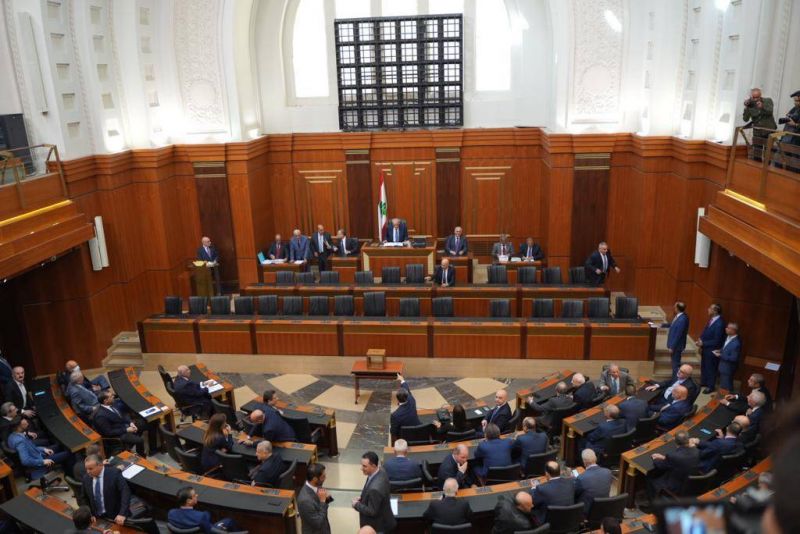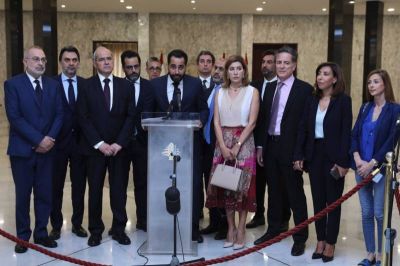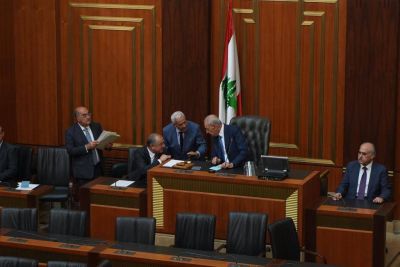
Lebanese MPs gather in Parliament on Oct. 24, during a fourth session to elect a new president. (Credit: Mohammad Yassin/L'Orient Today)
Lebanese MPs failed Monday, at the end of a fourth dedicated parliamentary session, to elect a successor to President Michel Aoun, whose term expires on Oct. 31.
This new failure came after several parliamentarians, including those from the Free Patriotic Movement and Hezbollah, withdrew from the session after a first round of voting, causing a loss of quorum.
According to Berri, more than 110 MPs attended the session, enough for it to continue, since the required two-thirds quorum is 86 out of 128 MPs. The MPs who were absent with an official excuse were Hassan Mrad, Hussein Haj Hassan, Jihad el-Samad, Nadim Gemayel, Ziad Hawat, Elias Khoury and Tony Frangieh.
After the session began at 11 a.m., 114 MPs participated in the first round of voting. Thirty-nine MPs voted for Zgharta MP Michel Moawad, who had received 42 votes in the third electoral session; 50 voted blank; 10 voted for professor Issam Khalifeh, 13 voted for "The new Lebanon," and two ballots were canceled.
After the loss of quorum, Parliament Speaker Nabih Berri set a new electoral session for Oct. 27 at 11 a.m but he added that he will confirm this date later.
Moawad loses votes
Speaking to the press after the end of the session, Michel Moawad estimated that he "obtained about the same number of votes" as in the last session. "I lost only one vote compared to the last session, since three MPs from the Lebanese Forces (Ziad Hawat, George Okais, Elias Khoury) and one MP from the Kataeb (Nadim Gemayel) were absent," he said. These MPs voted in his favor, during the last session.
Michel Moawad, the son of former president Rene Moawad, who was assassinated in 1989, received in fact three fewer votes than in the last session last Thursday.
Dialogue
"I don't think anything will change. We are heading for a dialogue next week or the week after," said Hadi Aboul Hosn, MP for Walid Joumblatt's Progressive Socialist Party. The day before, Berri told the pan-Arab newspaper Asharq al-Awsat that he will call for "an open dialogue" after the Oct. 31 constitutional deadline to elect a new president.
For his part, MP Ashraf Rifi (Independent/Tripoli) said that "some MPs from the parliamentary group of the National Moderation did not vote for Michel Moawad, which led to a decrease in the number of votes he got." The National Moderation bloc MPs are those who were formerly aligned with the Future Movement of Saad Hariri.
"The stalemate is due to the fact that the Parliament fails to elect a president and not because of the blank votes," said Free Patriotic Movement MP Alain Aoun, while his party, and those of Hezbollah and Amal, continue to cast blank ballots. "The election of a president is done by ensuring a minimal consensus," he said, stressing "the need for serious dialogue." "If all the groups continue to camp on their positions, we will not be able to reach an agreement," he added.
Finally, he welcomed Berri's call for dialogue.
MP George Adwan (Lebanese Forces/Chouf) said that the LF's parliamentary bloc, the Strong Republic, of which he is part, "continues with our clear choice of Michel Moawad," inviting other all other parliamentary blocs to settle their presidential candidates, adding that Moawad is a "sovereign" and "reformist" candidate.
Forces of Change bloc loses another MP
Forces of Change MP Waddah Sadek said that he voted for Michel Mouwad and not for Issam Khalifeh, claiming that, even though Khalifeh is a "credible" candidate, "there is an audio recording of him that has spread saying that he does not want to run for the presidency."
Sadek joined former Forces of Change MP Michel Douaihy in leaving the Forces of Change bloc, previously composed of 13 MPs. "I am a change MP, outside the [Forces of Change] bloc," Sadek said.
MP Firas Hamdan, responding to Sadek's statements, said that "every MP is free to position himself in the place he wants, and our choice today was Issam Khalifeh, because of his value and history, and our choice is political clarity, and this is our path."
'My condolences'
MP Jamil al-Sayyed told local media that he cast a "Awad bi salemtkon" ("my condolences" in Arabic) ballot — in other words a canceled ballot. Sayyed added that "the main issue is external, and the question is what is the strategic identity of the next president? Everyone is waiting for an external intervention, and, in my opinion, this is ought to happen." He went on to claim that France and Saudi Arabia will soon intervene.
Lebanon entered the presidential election period on Sept. 1, but Berri waited until Sept. 29 to call the first electoral session. Faced with a camp united behind Hezbollah, the opposition remains drowned in its differences, accentuated by the schism within the Forces of Change bloc MPs. While Zgharta MP Michel Moawad managed to increase his score from 36 votes in the first session to 42 in the third — the second session having been ended without any vote due to lack of quorum — he still seems far from gathering the support of a two-thirds majority, or 86 MPs, to be elected in the first round of voting.
In subsequent rounds, the president can be elected with an absolute majority of 65 votes. But to date, Parliament has not reached a second round of voting on candidates due to the loss of quorum at each of the sessions convened, with members of the camp loyal to Aoun and his allies withdrawing from the session after the first round of voting. At each session, Berri considers that the election process is reset, meaning Parliament again votes as if it is a first round ballot and the number of votes required to elect a president is 86.
The risk of a total vacuum in the executive branch looms over Lebanon as the end of Aoun's six-year term approaches, while the country has been without an active cabinet since May 22, following its assumption of caretaker status in the aftermath of parliamentary elections. The political party founded by Aoun, the Free Patriotic Movement, has scheduled a rally for Sunday at 11 a.m. at the Presidential Palace in Baabda to celebrate the end of the president's term in office.
Last Thursday, Berri said he will convene Parliament in consecutive sessions to elect a new president.
On Sunday, Maronite Patriarch Bechara al-Rai criticized the electoral sessions, saying they are a "play." For his part, Nabil Kaouk, a member of Hezbollah's executive council, accused the United States and Saudi Arabia of interfering in the election.

